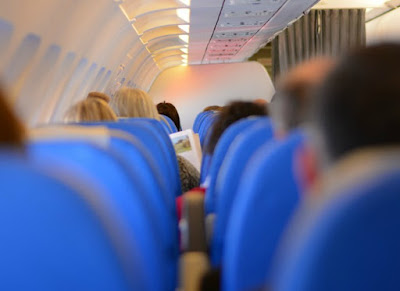Today we're sharing a guest post article with all of you from Dr. Niket Sonpal with some timely travel tips. Let's face it...no one wants to get sick while traveling or immediately upon returning home.
How to Avoid Illness and Other Medical Consequences While Traveling on Memorial Day Weekend
Memorial Day marks the unofficial start of summer. According to AAA, more than 41.5 million Americans will travel this Memorial Day weekend by car, plane, or train. Nothing ruins a long-awaited vacation faster than getting sick or being in medical distress. We turned to Dr. Niket Sonpal, an NYC internist and gastroenterologist for some tips on how to avoid health consequences will traveling.
Avoid Deep Vein Thrombosis
Deep Vein Thrombosis (DVT) occurs when a blood clot (thrombus) forms in one or more of the deep veins in your body, usually in your legs. Deep vein thrombosis can cause leg pain or swelling, but also can occur with no symptoms. For travelers, this can happen on long haul trips where you are not moving. Dr. Sonpal recommends if you are flying or on a train, to move around the cabin to get the blood flowing in your legs. If you are driving, take a break at a rest stop and walk around. Compression socks are also another option to prevent DVT.
People can experience motion sickness on virtually any mode of transportation. To combat this, Dr. Sonpal suggests Dramamine® Non-Drowsy Naturals, Dramamine®'s first non-drowsy formulation. It contains the clinically tested ginger dosage required for preventing and treating motion sickness. Other sources of ginger, including candies, gums, or ginger ale, may not contain a full clinical dose. For someone who is already experiencing nausea while traveling, it is a good idea to keep Emetrol on hand which is an over the counter nausea medication that does not cause drowsiness.
Avoid Bloating on a Plane
If you get gassy on a plane, you’re not alone! Dr. Sonpal explains that “as the pressure around you decreases, the gas in your belly isn’t constrained as much and it expands. This can make you feel bloated or become distended.” It is essential to avoid foods that cause gas or have salt. Skip the tomato juice in flight and stick with non-carbonated water. Avoid alcohol, cruciferous vegetables, dairy and high sodium snacks such as salted peanuts or pretzels. Foods that are protein packed, magnesium-rich and high in Vitamin C are good options.
Sanitize Your Surfaces
Planes and trains are a breeding ground for illness. The former is awful due to re-circulated air. Most travelers would be appalled if they really knew how germy their tray tables are! Dr. Sonpal suggests sanitizing wipes for your tray table, seat belt clip and hand rests of your seats on planes and trains. When you exit a restroom on a plane or train and touch the door handles, be sure to use hand sanitizer even if you already washed your hands.
Before you even book your trip, make sure you’re up to date on your shots. If you’re traveling to an area where you’re at risk for picking up an illness like malaria, you might be prescribed preventative medication. Dr. Sonpal suggests that “people should use the CDC website for recommended vaccines for travel abroad or see a travel clinic. The health risks posed to Americans vary based on the country they are traveling to.”
Don’t Touch the Ice!
When traveling to a different country, most people are very cautious about only drinking bottled water. Many folks forget that ice is simply frozen water and put it into their soft drinks or alcoholic beverages. Contrary to what one might think, freezing water does not kill bacteria. The only way to be sure it is safe is if you boiled the water and then froze it.
Avoid Jet Lag
Even a relatively short time change from EST to PST (3 hours) can cause jet lag. With some international travel from the United States, the time difference can be as much as twelve hours. If you're traveling east, try going to bed one hour earlier each night for a few days before your departure. Go to bed one hour later for several nights if you're flying west. If possible, eat meals closer to the time you'll be eating them at your destination. Dr. Sonpal suggests that you set your watch to the new time before you leave. Once you reach your destination, try not to sleep until the local nighttime, no matter how tired you are.
How to Find a Reliable Physician if you are Traveling Abroad
The US embassy in your destination country can help you locate medical services and will notify your family and friends in the event of an emergency. When selecting a doctor, make sure that he or she can speak your language.
Dr. Niket Sonpal is an Adjunct Assistant Professor at Touro College of Osteopathic Medicine and Clinical instructor at Kingsbrook Jewish Medical Center, Brooklyn who specializes in Gastroenterology. He is a graduate of the Medical University of Silesia – Hope Medical Institute in Poland. After completing his residency in Internal Medicine at Lenox Hill Hospital, he was selected to be the 2013‐2014 Chief Resident at Lenox Hill Hospital–Northshore LIJ Health System. Dr. Sonpal has completed his Fellowship in Gastroenterology & Hepatology at Lenox Hill Hospital and continues his work in the field of medical student and resident test preparation. He now serves as the associate program director for the Internal Medicine Residency Program at Brookdale University medical center. You can learn more about Dr. Sonpal by visiting HERE.











No comments:
Post a Comment